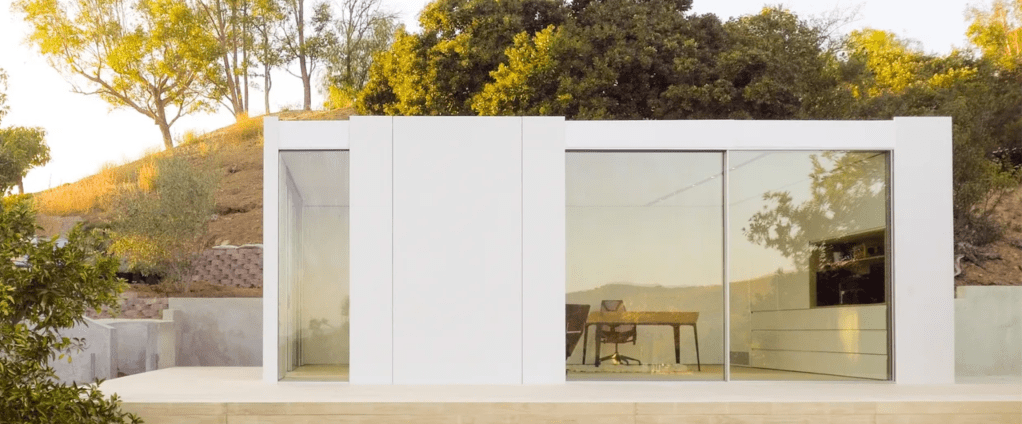There are lots of startups now working on modular home design. Among the most interesting is Cover, a seven-year-old, LA-based company that says it manufactures fully complete wall, floor and roof panels in its factory, then transports them on a standard truck and assembles them on site — without a crane.
The materials it is using are lightweight steel for the building frame and aluminum for the ceilings. The panels are made of a rubber composite because, as founder and CEO Alexis Xavier Rivas explains, “drywall is not designed for manufacturing or transport — it’s too brittle.”
Clearly, a lot of thought has been invested in how these buildings are designed. For example, the company installs all plumbing and electrical wiring in the ceiling, so that if an owner wants to run a new wire or pipe, she or he need only pop off the ceiling to do it.
It sounds strange, but it’s a lot less strange than sawing a series of holes in a wall, then patching them up and repainting them to achieve the same end. (It also requires less help from craftspeople like plumbers and electricians, who are in short supply right now.)
Other materials used include real wood and wood composites for the floors and exterior, and solid surface countertops and bathroom floors that are nonporous, meaning they’re more hygienic, as these things go, which matters increasingly to homeowners as the world emerges from a pandemic.
How the materials come together is naturally even more crucial, given that with Cover, much of the focus — and the promise — is on both quick assembly and customization.
According to Rivas, the process works as follows: A customer works with the company to create a design. Right now, that design is limited to single-story units that are 1,200-square-feet or smaller but which take into account factors such as where windows should be placed to minimize energy waste. (Rivas also notes here that the windows, made by Cover, are LEED-certified, and that its homes are airtight, vastly improving their energy efficiency.)
Cover then takes the agreed-upon design, at a price that’s established up front and includes permitting fees, city fees, foundation fees and the home itself — think $200,000 for 400-square-foot studio; $250,000 for a 600-square-foot, one-bedroom unit; and up to $500,000 for a 1,200-square-foot three-bedroom dwelling — and it gets to work engineering the pieces.
Somewhat amazingly, it says that after the foundation is complete, it can have the building built and installed within 30 days, down from the 120-window that it used to promise customers.
It also offers a 100% money-back guarantee if it can’t obtain the necessary permits, along with a lifetime structural warranty and a one-year warranty for everything else.
These buildings are “not going to rot,” says Rivas. “They aren’t going to be eaten by termites.” If a customer needs new air filters, on the other hand, “we’ll change them.”
Rivas, who grew up in Toronto, studied architecture in college and bounced briefly around a number of architectural firms before founding Cover, takes pride in being able to attract engineers from SpaceX and Tesla to the mission, and at various points during a conversation earlier this week, likened Cover’s processes to that of the automaker.
He’s seemingly not the only one who sees similarities. The company is today announcing that it has raised $60 million in Series B funding led by Gigafund, an investment firm that was founded by two former Founders Fund investors who have bet heavily on SpaceX.
Joining the round are Valor Equity Partners and Founders Fund — both of which are also early investors in SpaceX and Tesla — and a whole bunch of other notable backers, including General Catalyst, Lennar, Fifty Years, AngelList cofounder Naval Ravikant, Lowercase Capital founder Chris Sacca, Marathon Asset Management CEO Bruce Richards and Dropbox co-founder Arash Ferdowsi, among others.
Certainly, there’s no dearth of demand for what Cover is building, given the national housing — and construction — shortage. In fact, asked about Cover’s sales team, Rivas says that there is so much inbound interest that just “one-third of one person’s time is in sales” right now.
As for what people are ordering, Rivas says that most of the company’s customers have bought dwellings to accommodate either family moving in (an aging parent, a kid coming back from college); to create a home office apart from their house; or to establish a way to drum up rental income.
Still, beyond the roughly 20 backyard homes it has already built, the company — which has now raised $75 million altogether — very much intends to begin building bigger, multilevel homes, as well as multifamily units.
It mostly boils down to using more panels, Rivas says, which the company will be able to produce from the 100,000-square-foot factory into which it’s moving from the 25,000-square-foot warehouse it operates currently. (That’s where some of that $60 million is headed.)
Indeed, he says, if all goes as planned, sometime soon, even existing customers will be able to easily enlarge the homes they’ve already bought using the Cover app. It’ll be a snap, by his telling.
“You’ll go on the app, you’ll click on the room to which you want to add, then schedule it, pay online, and get your renovation done in two to three days.”
It’s the kind of curtain raiser for which Elon Musk is known. Now to see if Cover can pull it off.





























Comment